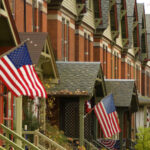Cook County and Property Taxes
All properties in Cook County are reassessed on a triennial schedule. Every three years, the new valuations – along with appeals, exemptions, local tax levies, and assessments of nearby properties – determine the amount of future property tax bills.
The Assessor’s Office, the Board of Review, the Cook County Clerk, and the Cook County Treasurer all play a role in the property tax system.
In addition to setting property values, the Assessor’s Office collaborates with other government agencies to stimulate economic growth, develop tax relief proposals, increase the amount of affordable housing in the county, and make the tax system more equitable.
Cook County Townships
For the purposes of reassessment scheduling, the 30 townships within Cook County are divided into three groups: north/northwest suburbs, south/southwest suburbs, and the City of Chicago.
Each township’s government provides a set of core services to its residents. These usually include road maintenance, issuance of building permits, and processing of tax exemption applications. All of these functions are financed by property tax revenue.
Some township governments offer community mental health services and social programs. They also maintain recreational areas and perform other functions beyond the core services. Property tax revenue is a source of funding for these local programs and services as well.
Taxpayers can access statistics about their township via the Cook County Assessor’s Office website, including median sales ranges for different property classes of residential real estate.
City of Chicago
The townships of Hyde Park, Jefferson, Lake, Lakeview, North Chicago, Rogers Park, West Chicago, and South Chicago all fall into the City of Chicago grouping.
For reference, here are some neighborhoods that are located within the 9 City of Chicago Townships:
- Hyde Park Township – includes Hyde Park, Kenwood, Woodlawn, Avalon Park, Burnside, Pullman, South Shore, South Chicago, East Side, Hegewisch, Calumet Heights, South Deering, and Riverdale neighborhoods
- Jefferson Township – includes Jefferson Park, North Park, Albany Park, Irving Park, Avondale, Hermosa, Belmont-Cragin, Montclare, Portage Park, and parts of Logan Square. Sections of the Norridge, Norwood Park, and Harwood Heights suburbs are also located in Jefferson Township.
- Lake Township – includes Englewood
- Lakeview Township – includes Uptown, Lincoln Square, North Center, Wrigleyville, and Lincoln Park
- North Chicago Township – includes Old Town, Gold Coast, Cabrini-Green, Magnificent Mile, and River North neighborhoods
- Rogers Park Township – includes Rogers Park and West Ridge
- West Chicago Township – includes West Town, West Loop, Pilsen, East Garfield Park, West Garfield Park, Little Italy, Heart of Chicago, Lawndale, and Greektown
- South Chicago Township – includes Chinatown, Grant Park, Prairie Shores, and Motor Row District
Property taxes unappealing…we can help!
Appealing your property taxes is one way to ensure that the amount you pay is fair whether you live in the north/northwest suburbs, south/southwest suburbs, or in the City of Chicago.
Staying on top of your assessment notices and researching local appeal procedures can help homeowners avoid being overburdened with property taxes.
Appeal.Tax can prepare your property tax appeal and handle it from start to finish. There is no fee unless a reduction is obtained. And we only charge a small portion of the overall tax savings secured.
Contact Appeal.tax today to discuss your Association, residential, or commercial property tax appeal. Tax Attorney Timothy Jacobs can be reached at 847-777-7270 or tjacobs@ksnlaw.com.
This article is made available by the lawyer or law firm publisher for educational purposes only as well as to give you general information and a general understanding of the law, not to provide specific legal advice. By reading this article you understand that there is no attorney client relationship between you and the article author. This article should not be used as a substitute for competent legal advice from a licensed professional attorney in your state. © 2024 Kovitz Shifrin Nesbit, A Professional Corporation.

